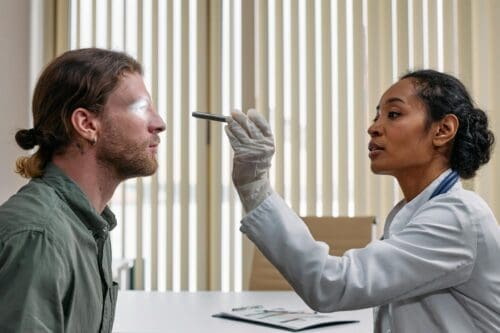Regular eye exams screen for various eye diseases and disorders and give you access to vision-correcting technology. During an eye exam, your eye doctor will identify early indicators of disease, even before you have symptoms. Your doctor helps you control and slow the progression of various disorders and diseases. At Collins Eye Center, we diagnose the following disorders and diseases:
1. Refractive Errors
Refractive errors are an eye condition that makes it difficult to see clearly. They occur when the shape of your eye prevents light from focusing correctly on your retina. The most common refractive errors include nearsightedness (myopia), farsightedness (hyperopia), astigmatism, and presbyopia. An eye doctor from Collins Eye Center will diagnose these conditions with a comprehensive eye exam. If you have a refractive error, your doctor may prescribe eyeglasses or contact lenses to correct your vision and improve clarity.
2. Cataracts
A cataract is the clouding of your eye’s lens, which causes cloudy vision and visual impairment. This makes it more difficult to carry out daily activities such as reading and driving. Cataracts develop with age, but they can also be caused by injury from past eye surgery, diabetes, or genetic disorders. Your doctor can diagnose this disease with a dilated eye exam, and treatment can include home care to manage symptoms or surgery to remove and replace the cloudy lens.
3. Diabetic Retinopathy
Diabetic retinopathy is a diabetes complication that can lead to vision loss and blindness if left untreated. It is caused by rising blood sugar levels that cause damage to the blood vessels in the retina. This condition is diagnosed using a dilated eye exam. Your doctor may also do a fluorescein angiogram test, which allows them to see pictures of the blood vessels in your retina. Diabetic retinopathy can be treated by controlling your diabetes, getting injections, or receiving laser treatment or eye surgery.
4. Macular Degeneration
Age-related macular degeneration (AMD) is a progressive eye disease affecting the macula, which is the central part of the retina responsible for the central field of vision. AMD may lead to significant visual impairment or blindness, particularly in older adults. Your eye doctor can check for AMD during a dilated eye exam. They may also recommend doing a test called optical coherence tomography (OCT) if they see signs of macular degeneration.
5. Glaucoma
Glaucoma comprises a group of eye conditions characterized by optic nerve damage. The most common form of glaucoma, primary open-angle glaucoma, is associated with increased fluid pressure inside the eye. Without treatment, glaucoma may lead to irreversible vision loss and blindness. Your doctor can use a dilated eye exam and a visual field test to diagnose glaucoma.
Make an Appointment With Your Eye Doctor Today
An eye doctor helps to diagnose and manage a wide range of eye diseases and disorders, from refractive errors to diabetic retinopathy. Routine eye exams aid in early detection and intervention, helping preserve vision and slow disease progression. At Collins Eye Center, we provide high-tech eyecare and testing to diagnose these disorders and diseases. We want to help you maximize your vision throughout your lifetime. Schedule an appointment today and come see us at our Brentwood, Tennessee, location.


